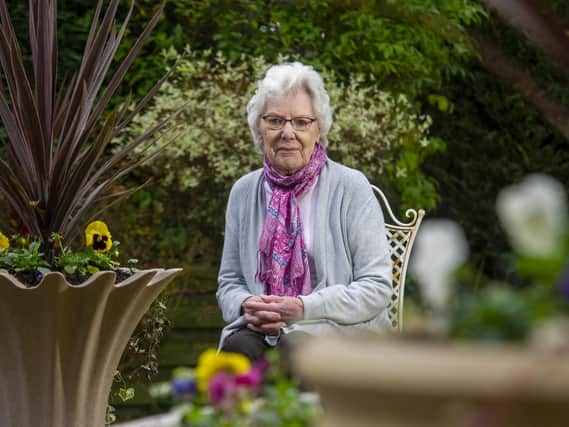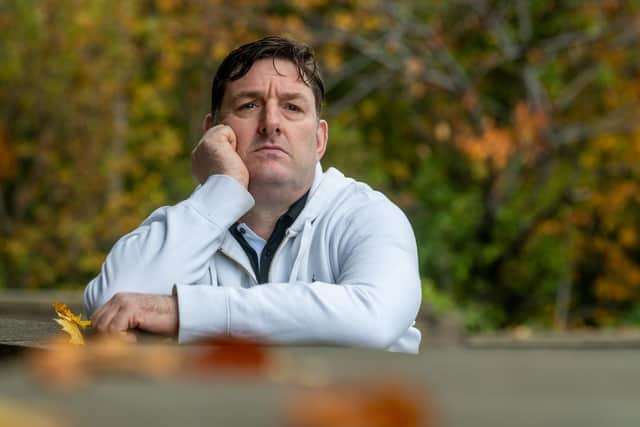Thousands of people in Yorkshire are being left in agony waiting for hospital treatment - sometimes for more than a year


Darren Blackburn could cope with the pain until about a year ago.
The 48-year-old, who lives in Halifax, is one of thousands of people in Yorkshire who have been forced to put their lives on hold while awaiting medical treatment.
Advertisement
Hide AdAdvertisement
Hide AdMr Blackburn has stage 4 osteoarthritis and has been waiting for surgery to fuse his ankle bones since January.


While NHS rules state all treatment should take place in 18 weeks or less, only a third of people in the region are treated within that timescale, according to the latest figures.
He said: “There’s no pain relief that a doctor can give you, sometimes it’s agony.
“The pain is a constant nightmare, it makes life a daily battle. It was manageable up to November 2019 but, after then, the steroid injections weren’t working anymore. My ankle joint had probably been bone on bone for about six months prior to this.
Advertisement
Hide AdAdvertisement
Hide Ad“So, the consultant said the final stage is having either a prosthetic ankle or fusion surgery. I chose the fusion because I was told it would eliminate the pain, and if I’d opted for the prosthetic ankle I would’ve been on a longer waiting list.”
Mr Blackburn still has no idea when his surgery will take place.
“I’d probably be recovering now if it weren’t for Covid.”
Prior to this, Mr Blackburn worked as a driver but, due to the strength of his pain medication, he can no longer drive.
He added: “I wonder how people are getting on with treatments like physio, because they will be stuck in the house needing this stuff and the pain can cause a great deal of anxiety and depression.
Advertisement
Hide AdAdvertisement
Hide Ad“I try not to dwell on it, I have down periods and it’s hard, but you can’t dwell on this stuff.
“When it can be done, it can be done. It’s not the best situation though.”
Giving up independence for long periods of time is common for anyone waiting for surgery.
Muriel Hartley from Baildon, West Yorkshire, said that without cataract surgery she too will be forced to stop driving, something she said would be a “disaster”.
Advertisement
Hide AdAdvertisement
Hide Ad“My main reason for treatment is so I can continue to drive safely,” she said, adding that she has begun to lose confidence.
As an older person during the pandemic she would be confined to her home and forced to rely on her daughter to bring groceries.
The 88-year-old is scheduled for treatment next week at Optegra eye hospital, a private clinic which is taking NHS patients to help lessen the load.
Mrs Hartley is one of the lucky ones as she has only been waiting three months, as figures show less than half of people in Bradford waiting for eye surgery get it within 18 weeks.
Advertisement
Hide AdAdvertisement
Hide AdShe said: “I will be glad when I have it done and can see clearly again.”
Ophthalmology has the third-longest waiting lists of any treatment type in Yorkshire and getting surgery can be a postcode lottery, as 80-year-old Valerie Bird discovered.
Mrs Bird’s optician is in Leeds, where waiting times for eye surgery are just eight weeks. But unfortunately, Mrs Bird lives in Harrogate, where average waiting times are 23 weeks - nearly half a year. In fact, official data for September showed 113 people in North Yorkshire had been waiting more than a year for eye surgery.
Such long waits can have profound effects for people with severe vision problems like Mrs Bird, who was first diagnosed with cataracts in both eyes 18 months ago and whose vision has deteriorated throughout lockdown.
Advertisement
Hide AdAdvertisement
Hide AdShe said: “My vision has gone so cloudy, reading is very difficult even though I already had reading glasses.”
Not only did Harrogate have longer waits but it also had a different criteria for surgery.
Mrs Bird has now had one eye treated with NHS cataract surgery and is due to have second eye treated next week.
She said: “If I cover up my good eye, it is like looking through a mist. Although I have been struggling to read, I had not realised just how poor my vision had become over the time I had been waiting for treatment.
Advertisement
Hide AdAdvertisement
Hide Ad“I felt frustrated at having to wait 18 months, and now I know how poor my vision had become the sooner the better for the second op.”
Someone else who is frustrated at the wait is 40-year-old Chris Dickinson from Doncaster - and it is easy to see why.
“I was added to the waiting list on the 28 Nov 2019,” he said.
“I was offered a short notice cancellation in February, just a few days notice. So my partner organised time off from her work and all the other things we needed in place. Then, a day before the surgery, they called and cancelled. And that was the last time I heard from them at all until a few days ago.”
Advertisement
Hide AdAdvertisement
Hide AdMr Dickinson is awaiting surgery for a back problem which has left him incapacitated for long periods.
He said: “I’m completely dependent upon max strength prescription painkillers and my muscles have begun to atrophy.
“It’s been surreal, just waiting, not knowing anything. Especially with the lockdown happening at the same time.
“For the first four months, I couldn’t walk or even sit, lay or sleep at all without extreme pain.”
Advertisement
Hide AdAdvertisement
Hide AdHis condition has improved slightly with rest and he can now walk a little but has left the house only four times in a year.
While the toll on his body has been tough, there have also been side effects for his loved ones.
“My partner, as well as her own job, had to do everything, even helping me wash,” he said.
He has also become financially reliant on his partner as he has exhausted his statutory sick pay from his job, which runs out after six months. He is looking forward to returning to work as soon as he has recovered.
Advertisement
Hide AdAdvertisement
Hide Ad“The worst thing for me about all of this hasn’t been the pain or the loss of social contact, it’s been the stress of having to pile everything on my partner’s shoulders, without even knowing how long that would continue.”
The good news for Mr Dickinson is, at long last, his surgery is scheduled for Tuesday, though he has had a lot of trouble scheduling a pre-op appointment and is still not certain the surgery will actually go ahead.
“Needless to say, my patience with the NHS is at its end.”